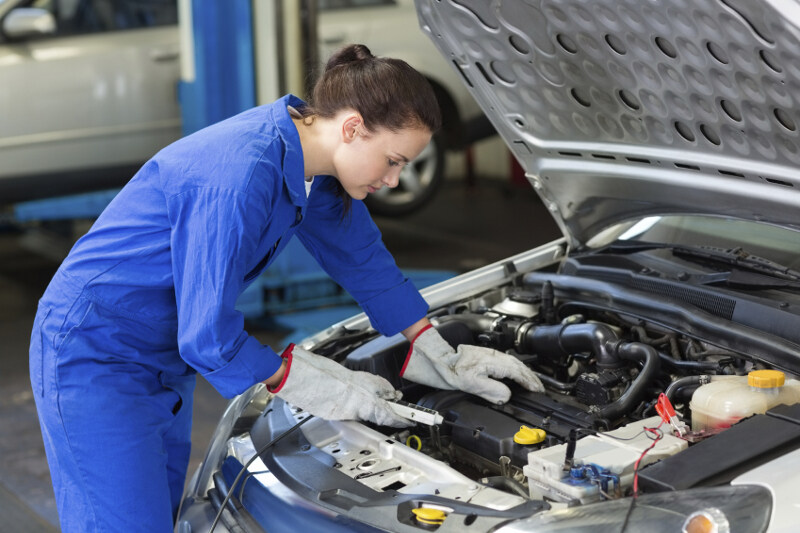All Categories
Featured
There are a variety of funding choices that can aid you pay for major lorry repair work over time. Below's a look at some of the finest choices for financing your automobile repairs.
![]()
Pros: Convenient, as financing is prepared directly with the shop. Numerous stores provide deferred interest for details period (e.g., 6-12 months), permitting you to pay off the equilibrium without rate of interest if it's paid in full within the marketing period. Cons: Rate of interest rates may enhance after the marketing duration ends, and authorization might be based on your credit scores history. Not all shops use this choice, so it may not constantly be offered. 2. Personal Lendings. Personal finances from a financial institution, credit report union, or on-line lender can be a superb choice for financing big repair work bills. These lendings generally use set rate of interest and predictable month-to-month settlements, making it simpler to intend for payment. Individual finances are versatile and can be used for any kind of type of repair work.
Pros: Reduced rate of interest than credit cards and flexible funding quantities. You may likewise be able to obtain a larger sum for significant fixings. Disadvantages: Car loan approval is typically based on your credit scores score. It can take numerous days to obtain approval, and the procedure may entail paperwork or costs. In addition, finance terms can vary from a few months to numerous years, so consider your capability to pay back the funding. 3. Credit score Cards. It can be an efficient method to fund car fixings if you already have a credit history card with a reduced rate of interest rate or a 0% APR promotional offer. Some bank card offer benefits or cash-back motivations, which can assist balance out some of the repair work expenses.
![]()
Pros: Immediate access to funds, and 0% APR supplies enable you to spread repayments in time without paying rate of interest (if paid off throughout the introductory duration) Some cards also offer money back or benefits. Cons: If the 0% APR period finishes and the equilibrium is not repaid, the interest rates can be high. You could sustain substantial costs if you don't pay off the financial debt promptly. Additionally, bring a large equilibrium on your card might adversely affect your credit report. 4. Home Equity Funding or HELOC. You may be eligible for a home equity loan or a home equity line of credit score (HELOC) if you have significant equity in your home. These financings enable you to obtain against the worth of your home, typically at a lower rate of interest price than various other kinds of funding.
Pros: Reduced rates of interest compared to personal fundings or charge card. You can borrow a larger amount for fixings, which can be valuable for considerable repair services. Disadvantages: Using your home as collateral suggests that stopping working to pay back the lending might lead to shedding your home. The authorization process is extra involved and can take longer contrasted to other financing options. 5. Auto Repair Loans. Some specialized lenders provide automobile fixing loans specifically designed to cover the cost of vehicle repairs. These car loans function likewise to individual fundings however are customized to auto-related costs. They may supply competitive passion prices and terms, depending on your creditworthiness.
![]()
Pros: These fundings can supply lower prices than credit cards and are specifically designed to help with car repairs, meaning the application process may be more structured. Disadvantages: Authorization normally depends on your credit report. The finance quantities might be restricted based upon your credit rating and the nature of the fixing. 6. Insurance Coverage. If your car's fixing is associated with a crash or damage covered by your insurance coverage, your insurance policy service provider might cover some or all of the cost of fixings. Comprehensive, collision, or even mechanical failure insurance coverage can possibly assist with major repair expenses.
Pros: If your fixing is covered under your insurance coverage, it can conserve you from paying out-of-pocket. Furthermore, your insurance policy carrier can recommend relied on service center. Cons: You might still need to pay a deductible, and not all repair services are covered under standard policies. In addition, your premiums might increase after submitting a claim. 7. Cash Advance Car Loans (Not Advised) While cash advance can supply quick access to funds, they are usually not advised because of their extremely high-interest rates and brief settlement terms. These financings can trap consumers in a cycle of debt if they're not repaid on time.
Pros: Access to cash rapidly. Cons: Incredibly high-interest rates and charges can make these fundings a costly alternative. If you're incapable to settle the funding in full, the financial obligation can swiftly spiral uncontrollable, bring about extreme monetary consequences. 8. Mechanic Layaway Plan. Some vehicle repair service stores provide layaway plan for consumers to cover the cost of repair work in installations. These plans may include interest-free durations or low-interest prices, making it an extra budget friendly choice if you need to handle huge repair bills.
Pros: Adaptable terms that enable you to repay the repair costs with time. Several layaway plan consist of no-interest or low-interest periods if repaid within a specified timespan. Disadvantages: Not all stores offer this solution, and terms may differ extensively relying on the shop. See to it to make clear the details of the repayment routine and any type of fines that can apply. Conclusion. The best financing option for your cars and truck repair service will certainly rely on the intensity of the repair work, your monetary situation, and your capacity to settle the car loan. Alternatives like auto repair work shop funding, personal loans, and credit history cards give prompt accessibility to funds, while home equity financings and auto repair work loans offer bigger car loan amounts at possibly lower prices. It is very important to contrast rates of interest, settlement terms, and costs to guarantee you're selecting the most effective option for your economic well-being. By thinking about all your funding selections, you can make a well-informed choice and get your car back when driving without breaking your budget plan.

- Vehicle Repair Work Shop Funding. Numerous car service center provide funding options to consumers that need to expand the expense of expensive fixings. This might be via in-house payment strategies or collaborations with third-party loan providers. These plans are developed to offer an immediate service to those that can not manage to pay for repair services upfront.
Pros: Convenient, as financing is prepared directly with the shop. Numerous stores provide deferred interest for details period (e.g., 6-12 months), permitting you to pay off the equilibrium without rate of interest if it's paid in full within the marketing period. Cons: Rate of interest rates may enhance after the marketing duration ends, and authorization might be based on your credit scores history. Not all shops use this choice, so it may not constantly be offered. 2. Personal Lendings. Personal finances from a financial institution, credit report union, or on-line lender can be a superb choice for financing big repair work bills. These lendings generally use set rate of interest and predictable month-to-month settlements, making it simpler to intend for payment. Individual finances are versatile and can be used for any kind of type of repair work.
Pros: Reduced rate of interest than credit cards and flexible funding quantities. You may likewise be able to obtain a larger sum for significant fixings. Disadvantages: Car loan approval is typically based on your credit scores score. It can take numerous days to obtain approval, and the procedure may entail paperwork or costs. In addition, finance terms can vary from a few months to numerous years, so consider your capability to pay back the funding. 3. Credit score Cards. It can be an efficient method to fund car fixings if you already have a credit history card with a reduced rate of interest rate or a 0% APR promotional offer. Some bank card offer benefits or cash-back motivations, which can assist balance out some of the repair work expenses.

Pros: Immediate access to funds, and 0% APR supplies enable you to spread repayments in time without paying rate of interest (if paid off throughout the introductory duration) Some cards also offer money back or benefits. Cons: If the 0% APR period finishes and the equilibrium is not repaid, the interest rates can be high. You could sustain substantial costs if you don't pay off the financial debt promptly. Additionally, bring a large equilibrium on your card might adversely affect your credit report. 4. Home Equity Funding or HELOC. You may be eligible for a home equity loan or a home equity line of credit score (HELOC) if you have significant equity in your home. These financings enable you to obtain against the worth of your home, typically at a lower rate of interest price than various other kinds of funding.
Pros: Reduced rates of interest compared to personal fundings or charge card. You can borrow a larger amount for fixings, which can be valuable for considerable repair services. Disadvantages: Using your home as collateral suggests that stopping working to pay back the lending might lead to shedding your home. The authorization process is extra involved and can take longer contrasted to other financing options. 5. Auto Repair Loans. Some specialized lenders provide automobile fixing loans specifically designed to cover the cost of vehicle repairs. These car loans function likewise to individual fundings however are customized to auto-related costs. They may supply competitive passion prices and terms, depending on your creditworthiness.

Pros: These fundings can supply lower prices than credit cards and are specifically designed to help with car repairs, meaning the application process may be more structured. Disadvantages: Authorization normally depends on your credit report. The finance quantities might be restricted based upon your credit rating and the nature of the fixing. 6. Insurance Coverage. If your car's fixing is associated with a crash or damage covered by your insurance coverage, your insurance policy service provider might cover some or all of the cost of fixings. Comprehensive, collision, or even mechanical failure insurance coverage can possibly assist with major repair expenses.
Pros: If your fixing is covered under your insurance coverage, it can conserve you from paying out-of-pocket. Furthermore, your insurance policy carrier can recommend relied on service center. Cons: You might still need to pay a deductible, and not all repair services are covered under standard policies. In addition, your premiums might increase after submitting a claim. 7. Cash Advance Car Loans (Not Advised) While cash advance can supply quick access to funds, they are usually not advised because of their extremely high-interest rates and brief settlement terms. These financings can trap consumers in a cycle of debt if they're not repaid on time.
Pros: Access to cash rapidly. Cons: Incredibly high-interest rates and charges can make these fundings a costly alternative. If you're incapable to settle the funding in full, the financial obligation can swiftly spiral uncontrollable, bring about extreme monetary consequences. 8. Mechanic Layaway Plan. Some vehicle repair service stores provide layaway plan for consumers to cover the cost of repair work in installations. These plans may include interest-free durations or low-interest prices, making it an extra budget friendly choice if you need to handle huge repair bills.
Pros: Adaptable terms that enable you to repay the repair costs with time. Several layaway plan consist of no-interest or low-interest periods if repaid within a specified timespan. Disadvantages: Not all stores offer this solution, and terms may differ extensively relying on the shop. See to it to make clear the details of the repayment routine and any type of fines that can apply. Conclusion. The best financing option for your cars and truck repair service will certainly rely on the intensity of the repair work, your monetary situation, and your capacity to settle the car loan. Alternatives like auto repair work shop funding, personal loans, and credit history cards give prompt accessibility to funds, while home equity financings and auto repair work loans offer bigger car loan amounts at possibly lower prices. It is very important to contrast rates of interest, settlement terms, and costs to guarantee you're selecting the most effective option for your economic well-being. By thinking about all your funding selections, you can make a well-informed choice and get your car back when driving without breaking your budget plan.
Latest Posts
Learn How WyHy FCU Saves You Money on Borrowing and Banking
Published en
1 min read
Find Montclare Auto Repair’s Leading Auto Repairs and Why Drivers Rely On Them
Published en
1 min read
Why Chicago Drivers Prefer Montclare Auto Repair for Reliable Service and Significant Savings
Published en
1 min read
More
Latest Posts
Learn How WyHy FCU Saves You Money on Borrowing and Banking
Published May 27, 25
1 min read
Find Montclare Auto Repair’s Leading Auto Repairs and Why Drivers Rely On Them
Published May 26, 25
1 min read
Why Chicago Drivers Prefer Montclare Auto Repair for Reliable Service and Significant Savings
Published May 24, 25
1 min read